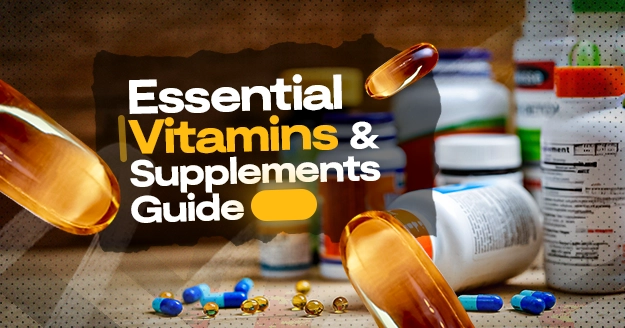Have you ever wondered how those tiny pills and capsules could make a difference in your health, or asked yourself, “What vitamins should I take daily?”
Vitamins and supplements are like your body’s helpers, filling in the gaps when your meals might not have everything you need. They don’t work like magic, but they do have a big impact on your strength and well-being.
This article highlights the significance of these tiny helpers, helping you understand how to pick the right ones for your well-being because whether you are aiming to boost your energy, support your immune system, or just stay in top shape, choosing the right vitamins and supplements can make all the difference in your daily life.
If you have wondered, “What supplement should I take then?” read on to find out.
Basics of Vitamins and Minerals
Vitamins and minerals are essential substances that your body needs to stay healthy and function properly. Vitamins, like vitamin C and vitamin D, play specific roles such as healing wounds, fighting off sickness, and helping your body use energy from food. Minerals, such as calcium, iron, and potassium, act as building blocks for strong bones, teeth, and muscles.
These nutrients are present in a wide range of foods, including whole grains, meat, fish, fruits, and vegetables. When a balanced diet consists of a variety of these foods, you can be certain that you are getting adequate vitamins and minerals from your diet. Sometimes, if you don’t get enough from food alone, doctors might suggest taking supplements to fill in the gaps and keep you healthy and strong.
What Vitamins Should I Take?
Age, gender, and lifestyle can all affect what your body needs to stay healthy and strong. Imagine your body like a house that needs different kinds of tools and materials to be built at different times.
Age
When you’re younger, your body is growing and changing a lot, so you need plenty of nutrients to help it grow strong bones, muscles, and brains. As you get older, your body might need different nutrients to stay healthy and keep your energy up. For example, older adults might need more calcium for their bones or Vitamin B12 for their nerves.
Gender
Boys and girls, and later men and women, often have different needs because their bodies work slightly in different ways. For instance, girls might need more iron to stay healthy, especially when they are having periods. Boys might need more protein to help build strong muscles.
Lifestyle
Your lifestyle, or how you live every day, can also change what your body needs. If you’re very active and play sports, you might need more energy from foods rich in carbohydrates. As protein and vitamin B12 are frequently found in animal products, you may need to look for other sources of these nutrients if you follow a vegetarian or vegan diet.
Specific Health Needs
Before taking any vitamins and supplements, it is crucial to consider any specific health needs you might have. There are various health conditions that may need special attention and significantly influence your nutrient requirements.
Here are some guidelines to help you decide:
- General Health: Multivitamin is a good starting point for most people. It helps close any nutritional gaps in your diet and provides a wide range of essential components.
- Bone Health: Vitamin D is essential for helping your body to absorb calcium especially if you don’t get much sunlight or have a higher risk of bone problems. Also, Calcium is especially important for children, teenagers, and older adults to maintain strong bones.
- Immune Support: Vitamin C is known for boosting the immune system and helping your body fight off colds and other illnesses. While Zinc supports immune function and can also aid in wound healing.
- Energy and Brain Function: The B Vitamins, especially B12 and B6 are especially important for energy levels and brain health. These vitamins may be helpful if you are experiencing fatigue or difficulty focusing. Iron can increase energy levels and help avoid anemia in women who feel exhausted and fatigued.
- Heart Health: Omega-3 Fatty Acids are supplements often found in fish and are beneficial for heart health and reducing inflammation.
- Pregnancy and Prenatal Care: It is essential for pregnant women to take Folic Acid to help prevent birth defects and support the baby’s development. Additionally, prenatal vitamins are available, which usually contain calcium, iron, folic acid, and other vital minerals for the mother and the developing baby.
- Skin, Hair, and Nails: Biotin is known to support healthy hair, skin, and nails.
- Vegetarians and Vegans: A plant-based diet requires vitamin B12, which is frequently present in animal sources. They might also be low in iron, so supplements that provides iron can help.
So, in case you’re asking, “Which supplement should I take?” before starting any new vitamin or supplement regimen, it is recommended to see a healthcare professional. They can help you understand your specific needs and recommend the best supplements to take to support your health goals.
Common Nutrient Deficiencies
Common Nutrient Deficiencies happen when our bodies don’t get enough of certain important vitamins and minerals from the food we eat. For instance, a lot of individuals don’t receive enough vitamin D, which maintains the strength of our bones and boosts our immunity.
Iron is another nutrient that is frequently lacking in our bodies, which is necessary for the production of healthy red blood cells that deliver oxygen. Weakness and exhaustion may result from low iron intake. Vitamin B12 is another one; it helps keep our nerves and blood cells healthy, and not having enough can make us feel tired and cause problems with thinking clearly.
These deficiencies may arise from a diet lacking in a variety of fruits, vegetables, and whole grains, or from problems our systems have absorbing these nutrients. Most of the time, supplements can help us fill these deficiencies to keep us feeling our best.
Essential Vitamins and Minerals Found in Foods
Foods that are rich in essential vitamins and minerals are like superheroes for our bodies, providing the fuel and building blocks we need to stay healthy. Here are some examples:
- Vitamin C
It keeps our skin and gums healthy and boosts our immune system. Citrus fruits (such as oranges, strawberries, and kiwis) and vegetables (such as bell peppers and broccoli) are common sources of vitamin C.
- Vitamin D
You can get this from sunlight, but also from foods like fatty fish like salmon and tuna, egg yolks, and fortified milk and cereals. It is also important for strong bones and helps our bodies absorb calcium.
- Calcium
Dairy products include cheese, yogurt, and milk; they are excellent providers of calcium. Additionally, it is present in fortified meals like several juices and cereals, as well as leafy greens like spinach and kale. Calcium is necessary for strong teeth and bones.
- Iron
It is found in foods like lean meats such as beef and chicken, fish, beans, lentils, and tofu. Iron helps our bodies make healthy red blood cells that carry oxygen throughout our bodies, preventing tiredness and weakness.
- Potassium
Potassium is abundant in bananas, but it’s also present in sweet potatoes, leafy greens, potatoes (with skin on), and oranges. Potassium helps our muscles and nerves work properly.
- Vitamin A
Carrots, sweet potatoes, and dark leafy greens like spinach and kale are rich in Vitamin A. It is important for good vision, a strong immune system, and healthy skin.
Types of Supplements
Supplements come in different types, each designed to help our bodies in various ways. Here is an overview of the main types:
Multivitamins
These are the most common supplements and contain a mix of different vitamins and minerals. They are designed to fill in any gaps in your diet and ensure you get a little bit of everything you need to stay healthy.
Single Vitamins
Sometimes, you might need extra amounts of a specific vitamin. For example, Vitamin D supplements can help if you don’t get enough sunlight, and Vitamin C supplements can boost your immune system. These are good for targeting specific needs.
Mineral Supplements
These provide important minerals like calcium for strong bones, iron for healthy blood, and magnesium for muscle function. They are useful if your diet is low in these minerals.
Omega 3 Fatty Acids
Found in fish oil supplements, these are good for heart health and brain function. They may also aid in the body’s reduction of inflammation.
Probiotics
Your digestive system’s health is supported by these advantageous bacteria. They can improve digestion and boost your immune system. You can find them in supplements or foods like yogurt.
Herbal Supplements
These come from plants and are used for various health benefits. For example, echinacea is often taken to help with colds, while ginseng can boost energy levels.
Protein Supplements
Commonly used by athletes and people looking to build muscles, these supplements provide extra protein that helps repair and build muscles. They come in forms like powders, bars, and shakes.
Specialty Supplements
These are designed for specific health concerns or needs. For example, glucosamine and chondroitin are often used for joint health, while coenzyme Q10 (CoQ10) is taken for health and energy production.
Choosing the appropriate vitamins and supplements is similar to providing your body with the best tools to maintain strength and health. Understanding your needs, eating a balanced diet, and knowing which vitamins and minerals are important can help you make smart choices for your health. Remember, the best supplements to take are those that match your unique needs and help fill what is lacking in your diet.








